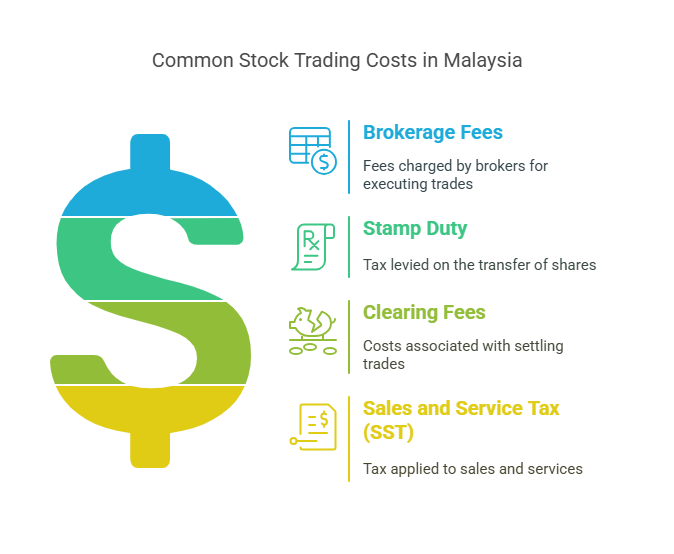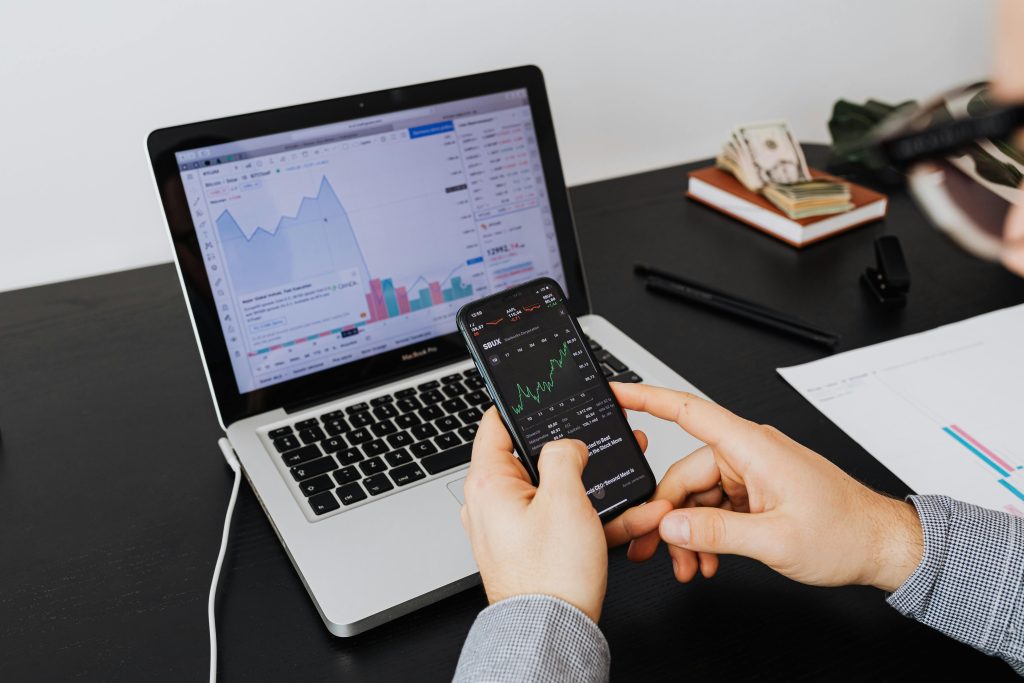Stock trading in Malaysia is an exciting way to grow wealth, whether you’re a seasoned investor or just starting out. But beyond the thrill of buying and selling stocks, it’s crucial to understand the various costs involved so you make the right decision in your trading journey.
While some fees are obvious, others can quietly eat into your returns if you’re not careful. So, in this article, we will walk you through the common and hidden costs of stock trading in Malaysia and how to keep your expenses in check.
Common Stock Trading Fees in Malaysia
When trading stocks, you’ll encounter a few standard fees no matter which Malaysia trading platform you use. Here are the key ones to know:

1. Brokerage Fees
This is the commission charged by an online broker in Malaysia every time you buy or sell a stock. Fees can vary depending on the broker, the trade size, and whether you’re trading local or foreign stocks. Some online brokerage in Malaysia platforms offer competitive rates for frequent traders, while others have flat fees for casual investors.
2. Stamp Duty
The Malaysian government imposes a stamp duty of 0.1% per transaction, capped at RM1,000. This means for every RM10,000 worth of shares you buy, you’ll pay RM10 in stamp duty. While it might not seem like much, it can add up if you’re trading frequently.
3. Clearing Fees
Bursa Malaysia charges 0.03% per transaction (capped at RM1,000 per trade) for clearing and settling trades. This ensures that the stock transfer process between buyers and sellers runs smoothly.
4. Sales and Service Tax (SST)
Brokerage fees in Malaysia are subject to 6% SST, which increases the total amount you pay per trade. Some brokers include SST in their fees, while others list it separately, so always check the breakdown.
Hidden Costs That Can Impact Your Returns

Apart from the obvious costs, there are some sneaky fees that could eat into your profits:
1. Currency Conversion Fees
If you’re wondering how to buy US stock in Malaysia, be aware that foreign stock purchases require currency conversion. Your broker will either charge a fee or offer a less favourable exchange rate, which can impact your investment. Always check the conversion fees incurred before you make any currency conversion.
2. Custodian Fees
Investing in foreign stocks? Some stock brokers in Malaysia platforms charge custodian or safekeeping fees for holding your foreign shares. This can range from a fixed fee to a percentage of your holdings. Phillip Capital Sdn Bhd does not charge any custodian fees.
3. Withdrawal and Deposit Fees
While many Malaysian trading platform options offer free deposits and withdrawals, some charge fees for specific payment methods. Always check your broker’s terms to avoid surprise charges when moving funds in and out of your account. No withdrawal and deposit fees incurred when doing transactions from Phillip Capital.
4. Margin Account Interest
If you’re trading on margin (borrowing money to buy stocks), your broker will charge interest on the borrowed amount. While margin trading can amplify profits, the interest cost can quickly erode your gains if the stock doesn’t perform as expected. Always check the margin interest when you are having a margin account.
Comparing Stock Broker Malaysia Fees
| “Striking a balance between ambition and contentment is crucial. Being excessively greedy or dissatisfied after profitable trades can impact decision-making and distort perspectives.”Fred Razak, senior trading strategist at CMTrading |
With so many brokerage options available, it is important to make the right decision. Make sure to compare fees before choosing the right platform for you. Consider these four factors:
- Brokerage Fees – Look at both flat fees and percentage-based charges to find the best fit for your trading style.
- Trading Platform Features – A good online brokerage in Malaysia platform should have easy-to-use tools, real-time data, and research insights.
- Customer Support – Ensure the broker provides responsive support, especially if you’re new to stock trading in Malaysia.
- Regulatory Compliance – Make sure your broker is registered with the Securities Commission Malaysia to protect your investments.
For stock trading for beginners, it’s wise to start with a broker that offers educational resources, demo accounts, and affordable fees.
How to Minimise Trading Costs

Want to reduce your expenses when trading? Here are some tips:
1. Choose a Cost-Effective Broker
Compare fees for stock brokers in Malaysia before opening an account. Some brokers have lower fees for frequent traders, while others offer flat rates for casual investors.
2. Use Fee-Free Deposit & Withdrawal Options
Check if your Malaysian trading platform offers free deposits and withdrawals to avoid unnecessary charges.
3. Stay Updated on Fee Changes
Brokers update their fees from time to time, so reviewing your brokerage’s pricing structure regularly ensures you’re always aware of any changes.
Why Choose Phillip Capital for Cost-Effective Trading?

At Phillip Capital, we offer competitive fees and advanced tools to help you trade smarter. Our services include:
- Access to 10+ Global Exchanges – Trade stocks in Malaysia, the US, Hong Kong, Australia, Singapore, and more.
- Fast & Seamless Trading – Enjoy a smooth trading experience with high-speed connections to global equities markets.
- POEMS Global MY 3.0 Platform – A powerful trading platform featuring:
- Personalised Interface with Integrated Trading Tools
- Global Market Analytics & Live Charts
- Multi-lingual Support for International Investors
- Personalised Interface with Integrated Trading Tools
Maximise Your Investment Returns
Understanding the true cost of stock trading in Malaysia is key to maximising your investment returns. By being aware of both common and hidden fees, you can make smarter trading decisions and minimize unnecessary costs.
Ready to trade smarter? Explore Phillip Capital today or start with our POEMS Global MY 3.0 for a powerful and seamless trading experience! 🚀









